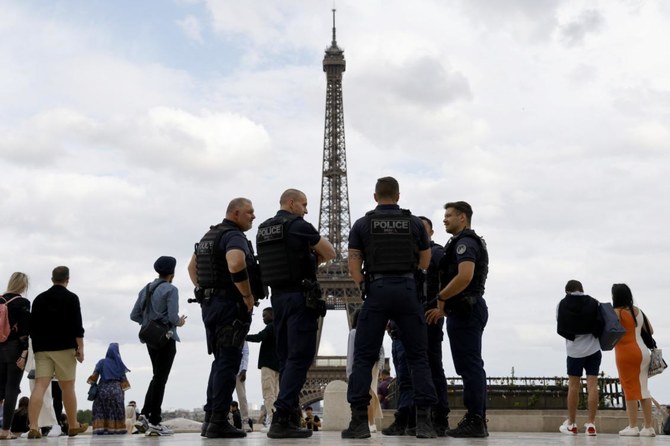PARIS: Around 2,000 people defied a ban to join a memorial rally in central Paris Saturday for a young black man who died in police custody, while marches took place throughout France to denounce police brutality, as tensions run high after days of rioting engulfed the country.
Nationwide, around 5,900 people took to the streets, according to the interior ministry.
Seven years after the death of Adama Traore, his sister had planned to lead an annual commemorative march north of Paris in Persan and Beaumont-sur-Oise.
But fearful of reigniting recent unrest sparked by the police killing of 17-year-old Nahel M. at a traffic stop near Paris, a court ruled the chance of public disturbance was too high to allow the march to proceed.
In a video posted on Twitter, Assa Traore, Adama’s older sister, denounced the decision.
“The government has decided to add fuel to the fire” and “not to respect the death of my little brother,” she said.
She instead attended a rally in central Paris’s Place de la Republique.
“We are marching for the youth to denounce police violence. They want to hide our deaths,” she said at the rally, also attended by several lawmakers.
“They authorize marches by neo-Nazis but they don’t allow us to march. France cannot give us moral lessons. Its police is racist and violent,” she said.
Worried about a resurgence of rioting as France celebrates Bastille Day on July 14, Prime Minister Elisabeth Borne told the daily Le Parisien that the government would deploy “massive means to protect the French” during the national holiday.
While she said Interior Minister Gerald Darmanin would give specifics, Borne announced a ban on the sale of fireworks, which had been used by rioters to target police.
The Paris rally for Traore had also been banned on the grounds that it could disrupt public order and a legal case has been opened against Assa Traore for organizing the event, police said.
Youssouf Traore, another of Assa Tarore’s brothers, was arrested and taken into custody on suspicion of violence against a person holding public authority, public prosecutors told AFP.
“The march went off peacefully, it was a success, we don’t understand his arrest,” Assa Traore said.
Jean-Luc Melenchon, leader of the hard-left France Unbowed party, castigated the government.
“From prohibition to repression... the leader is taking France to a regime we have already seen. Danger. Danger,” he tweeted, referring to the World War II regime of Vichy leader Philippe Petain who collaborated with the Nazis.
Many at the rally shouted “Justice for Nahel” before calmly dispersing later in the afternoon.
Around 30 demonstrations against police violence also took place across France, including in the southern port city of Marseille and Strasbourg in the east. Authorities in Lille banned a gathering.
Several trade unions, political parties and associations had called on supporters to join the march for Traore as France reels from allegations of institutionalized racism in its police ranks following Nahel M.’s shooting on June 27.
Traore, who was 24 years old, died shortly after his arrest in 2016, sparking several nights of unrest that played out similarly to the week-long rioting that erupted across the country in the wake of the point-blank shooting of Nahel.
The UN Committee on the Elimination of Racial Discrimination (CERD) — 18 independent experts — on Friday asked France to pass legislation defining and banning racial profiling and questioned “excessive use of force by law enforcement.”
The foreign ministry on Saturday disputed what it called “excessive” and “unfounded” remarks by the panel.
“Any ethnic profiling by law enforcement is banned in France,” the ministry responded, adding that “the struggle against excesses in racial profiling has intensified.”
Far-right parties have linked the most intense and widespread riots France has seen since 2005 to mass migration and have demanded curbs on new arrivals.
More than 3,700 people have been taken into police custody in connection with the protests since Nahel’s death, including at least 1,160 minors, according to official figures.
















